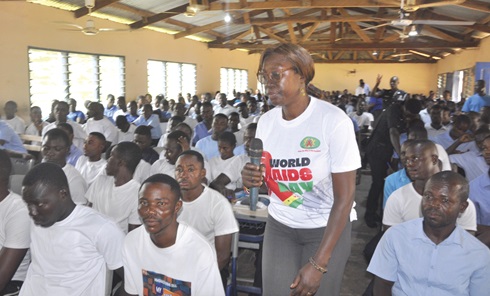
The Ghana AIDS Commission has stated that People Living with HIV (PLHIV) do not die from the virus itself, but rather from the stigma that society attaches to them.
It said that although HIV remained a significant issue in the country, the human rights of the PLHIV must always be respected.
The Volta/Oti Regional Technical Coordinator of the commission, Mary Naa Asheley Anyomi, presenting a paper on the ‘State of HIV Epidemic’ at a Ghana AIDS Commission/Youth Employment Agency forum in Ho, said stigma and discrimination against people living with HIV discouraged testing, treatment and disclosure, while cultural and religious barriers limited discussions on sex education, condoms use and reproductive health.
She was presenting the paper to 945 trainee Community Police Assistants (CPAs) at the Ho Police Training School in Ho.
The technical coordinator entreated the CPAs to be HIV advocates to their peers and community members and abstain from unprotected sex at their duty posts, adding that prevention is always better than cure.
Life
Sharing some data on the disease in the region, Mrs Anyomi stated that there are now 19,078 people living with HIV in the Volta Region. They include 4,999 males, 12,881 females and 1,198 children under 14 years.
Also, eight districts – Anloga, Ho, Hohoe, Ketu South, North Tongu, South Tongu, Ketu North and Ho contributed 75 per cent of the total number of new infections in the region, and 60 per cent of every 100 new infections recorded were among females, she said.
Seven of the 18 districts and municipalities in the region had less than 60 per cent of anti-retroviral coverage, and only one district had the highest coverage of over 61 per cent, while the target was 95 per cent.
Challenges
Mrs Anyomi stated that HIV could be managed and when one was on treatment, the likelihood of infection was reduced by 80 per cent, emphasising that there was life after HIV as its treatment was effective and PLHIV could lead everyday lives with proper treatment.
She, therefore, described how very unfair it was that some PLHIV were subjected to stigmatising and discriminatory attitudes in their communities, which compelled some of them to relocate to other places.
For instance, she said, a study in 2022 revealed that 48.6 per cent of men in the Volta Region believed children living with HIV should not attend school with other children, while 59.8 per cent of them would not buy fresh vegetables from a shopkeeper living with HIV.
Furthermore, low condom use among young people, especially adolescent girls and young women, was a significant challenge, she added.
Also, stigma and discrimination against people living with HIV discouraged testing, treatment and disclosure, while cultural and religious barriers limited discussions on sex education, condom use and reproductive health.
Mrs Anyomi emphasised the importance of implementing community-based testing programmes to reach remote or marginalised populations and address the drivers of the epidemic at festive and national events.



